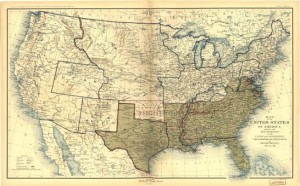 The Civil War era bisects the early decades of expanding Baptist scholarship North and South. Higher educational opportunities for Baptists of the North were introduced with the founding of Brown University in Providence, Rhode Island in 1764, after which more Baptists institutions, both North and South, were birthed in the early nineteenth century. By the time the war began, the nation’s most prominent Baptist congregations were typically pastored by university educated ministers.
The Civil War era bisects the early decades of expanding Baptist scholarship North and South. Higher educational opportunities for Baptists of the North were introduced with the founding of Brown University in Providence, Rhode Island in 1764, after which more Baptists institutions, both North and South, were birthed in the early nineteenth century. By the time the war began, the nation’s most prominent Baptist congregations were typically pastored by university educated ministers.
The hardships of the war, not surprisingly, impact Baptist educational institutions and individual scholars. Virtually all Baptist schools suffer a drop in student numbers, with some suspending classes temporarily and others being forced to close their doors permanently. Some professors volunteer for military service or are drafted into the army. Those who do not bear arms are often left to their own devices, some turning to other ministries, some to business enterprises, and others to cultivating the land.
Younger scholars are particularly impacted by the war. Some, primarily in the North, are able to continue with their professional careers, whether in the states or abroad. Others soldier in the army.
Philadelphia native Robert M. Luther, born in 1842, is seemingly immune to the ill fortunes of war. As a young man he followed in the footsteps of his parents in becoming a Presbyterian at the age of fifteen. Feeling called to the ministry, he was so moved when attending a Baptist baptism service in 1859 at Philadelphia’s Tabernacle Baptist Church in 1859 that he converted to the Baptist faith, much to the consternation of his family.
While yet feeling tension with his family, Luther joined the Nicetown Baptist Church in Philadelphia and was licensed to preach by the congregation in 1860, after which he finished his studies at Princeton, New Jersey.
Today Luther, having completed his studies and only recently married, is ordained by the Nicetown congregation. One month hence the Luthers sail to Rangoon where they serve as missionaries among the Burmese. In Burma Robert preaches, teaches and practices medicine until ill health leads the couple to return to the states in 1870. Upon re-settling in the states, Robert continues his professional ministerial career.
The fortunes of Chantilly, Virginia native Lewis Minor Coleman are of a decidedly different nature. Born in 1827, he attended the University of Virginia, joining the First Baptist Church of Richmond during his studies. Upon graduation from the university he spent the following decade teaching in academies in Virginia. His scholarly aptitude was ably rewarded in 1859 when he was elected Professor of Latin at the University of Virginia.
The coming of war, however, quickly derailed the young scholar’s career path. Enlisting as an officer in the Confederate Army in August 1861, the following year he rose within the ranks to become Lieutenant Colonel of the First Virginia Infantry, serving under the legendary Confederate General Thomas “Stonewall” Jackson. Wounded in the Battle of Fredericksburg in 1862, Coleman’s seemingly minor wound turns out to be fatal, leading to his death in the spring of 1863.
Yet death, in some ways, proves sweeter for the young scholar and soldier than life does for others. The darkness now hovering over the Confederacy makes for desperate times in which hope and heroes are much needed. Perhaps John L. Burrows, pastor of the First Baptist Church of Richmond and ardent defender of the Confederacy, senses this very fact, for he publishes this spring a book that serves as a glowing tribute to Lewis Minor Coleman, national hero.
Burrows’ volume honors a Southern gentlemen, scholar, Christian and soldier. There is nothing uncomplimentary of Coleman in the pastor’s accounting of a untarnished hero who joyfully serves God and country and then, when death comes calling, greets the grave with a peaceful smile, modeling a “good death.”
Even Stonewall Jackson, in his own death now venerated as a Southern saint, pays a great tribute to Coleman in Burrow’s telling. Notified of Coleman’s passing, Jackson wrote to the deceased’s brother, “Had your brother lived, it was my purpose to become better acquainted with him. I saw much less of him than I desired. I look beyond this life to an existence where I hope to know him better. “Very truly, your friend, “T. J . Jackson.”
In this time of war, both a good life and a good death matters. During the war, American (Northern) Baptists frequently celebrate their well-educated elites who forsake riches and prestige in America to serve as foreign missionaries. At the same time, white Southern Baptists often celebrate the noble battlefield sacrifices made by their well-educated sons in service of God’s Confederate nation. Each sacrifice is for a gospel of freedom, albeit “freedom” defined in much different ways.
Sources: “Luther, Rev. Robert M.,” in William Cathcart, The Baptist Encyclopedia, Vol. 2, Philadelphia: Louis H. Everts, 1883, pp. 727-728 (link); John. L. Burrows, The Christian Scholar and Soldier. Memoirs of Lewis Minor Coleman, Professor in the University of Virginia – Lieut. Col. of First Regiment Virginia Artillery, Richmond: Smith & Bailey, Virginia Baptist Publication and Sunday School Board, 1864 (link); Louise Pecquet du Bellet, Edward Jaquelin, Martha Cary Jaquelin, Some Prominent Virginia Families, Volume 2, Lynchburg, Va.: J. P. Bell, 1907, pp. 409-410 (link)


